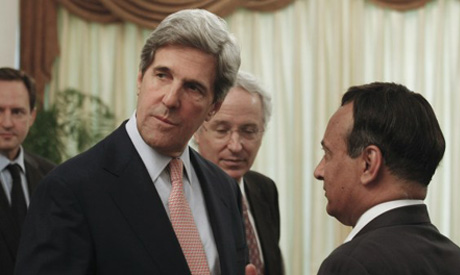
U.S. Senator John Kerry, left, talks with Hussain Haqqani, right, Pakistan ambassador to the United States, in Islamabad, Pakistan, Monday, (AP).
Compounding Pakistan's reputation as an unstable Muslim country infested with militants, gunmen on motorcycles shot dead a Saudi diplomat in the city of Karachi as he was driving to work.
Al Qaeda-linked Pakistani Taliban militants, who have vowed to strike back for the killing of Saudi-born bin Laden, claimed responsibility.
U.S. special forces flew in from Afghanistan on a secret operation to find and killal Qaeda chief bin Laden on May 2, nearly 10 years after he orchestrated the Sept. 11 attacks on the United States.
His discovery holed up in the comfortable garrison town of Abbottabad, only 50 km (30 miles) from the Pakistani capital, has revived suspicion that U.S. ally Pakistan knew where he was and has been playing a double game.
Pakistan has rejected that as absurd. It welcomed bin Laden's killing as a big step in the fight against militancy but objected about being left in the dark over the raid to get him.
Parliament condemned the raid on Saturday as a violation of Pakistan's sovereignty and called for a review of ties.
It also said the government should consider cutting U.S. supply lines through Pakistan for U.S. forces in Afghanistan in the event of another "unilateral" assault.
Kerry arrived in Pakistan on Sunday from Afghanistan where he told reporters the United States wanted Pakistan to be a real ally in the fight against militancy.
Kerry, a Democrat close to the Obama administration and who is chairman of the Senate Foreign Relations Committee, met powerful army chief General Ashfaq Kayani at army headquarters late on Sunday and was due to meet other leaders on Monday.
While Kerry has tough questions for Pakistan, its military can be expected to convey its anger over the U.S. assault on bin Laden, which military officials say has caused a breakdown in trust and cast a shadow over security cooperation.
"Kayani ... apprised the visiting dignitary about intense feelings of rank and file of the Pakistan army on the Abbottabad incident," the military said in a statement on Monday, referring to the operation to get bin Laden.
It did not elaborate but said Kerry would hold detailed discussions on relations with government leaders on Monday.
The Nation newspaper, which generally reflects the thinking of the military establishment, said Kerry's mission was to pressure Pakistan into accepting all U.S. demands, even at the cost of Pakistan's national interests.
"The U.S. may have serious questions post-Osama episode, but Pakistan stands totally disenchanted and dismayed," the paper said in an editorial.
The government should stick to the positions spelled out by parliament on the weekend, it said.
"There should be no compromise on sovereignty and national interests at any costs."
The U.S. administration has not accused Pakistan of complicity in hiding bin Laden but has said he must have had some sort of support network, which it wants to uncover.
U.S. Secretary of State Hillary Clinton spoke on Sunday to President Asif Ali Zardari by telephone about the situation since bin Laden's death, Zardari's office said, adding Zardari told Clinton about parliament's concerns.
"Both agreed to resolve the issues amicably and move forward," the president's office said.
Police in the southern commercial hub of Karachi said gunmen on motorcycles killed the Saudi diplomat. The attack came days after assailants threw two hand grenades at the Saudi consulate in Pakistan's commercial hub. No one was hurt in that attack.
Al Qaeda is violently opposed to the Saudi government, which is a close ally of Pakistan, and has vowed revenge for the killing of its leader. Their allies, the Pakistani Taliban, said they killed the diplomat.
"We take responsibility," a Taliban spokesman said by telephone from an undisclosed location, referring to the killing of the diplomat earlier in the day.
"Until America stops chasing al Qaeda and stops drone strikes we will keep carrying out such attacks," he said, referring to U.S. attacks with pilotless aircraft on militants in northwest Pakistan.
Short link: